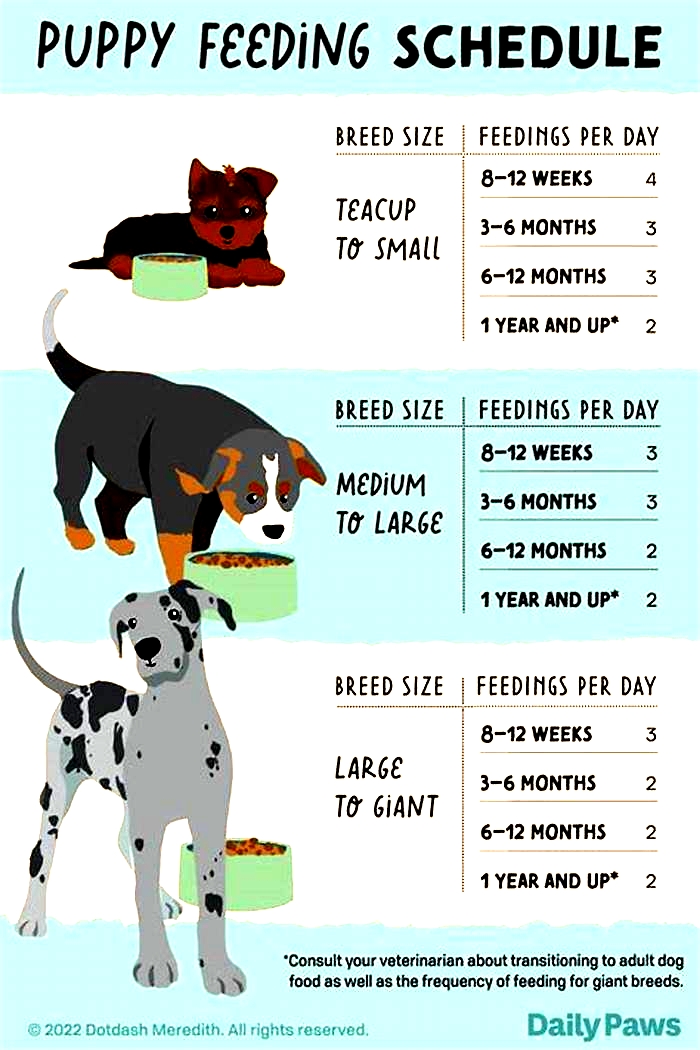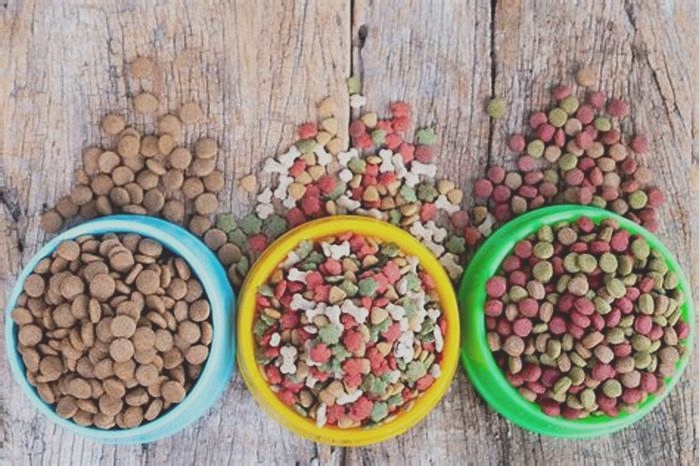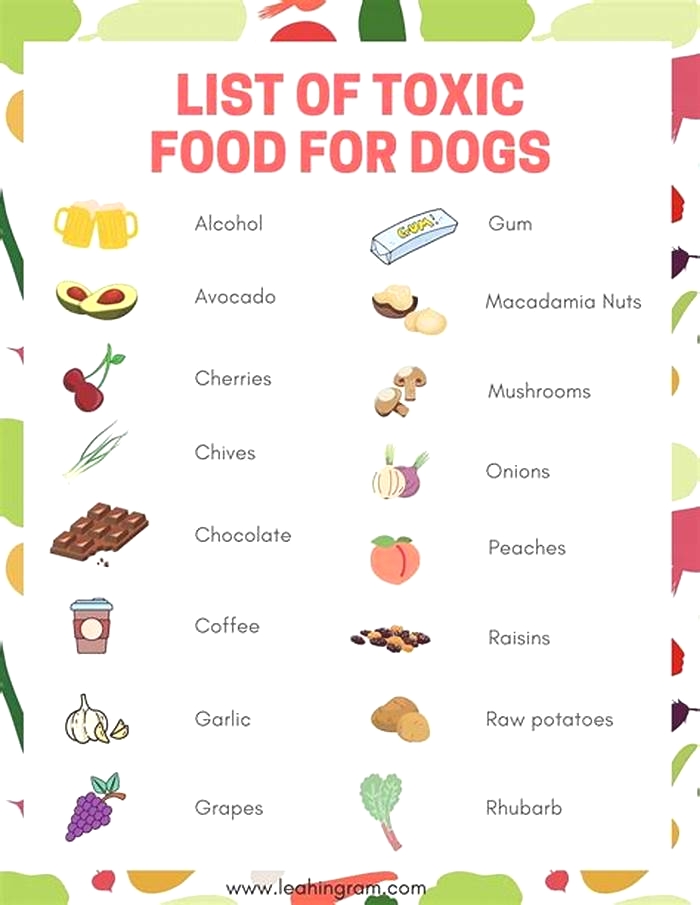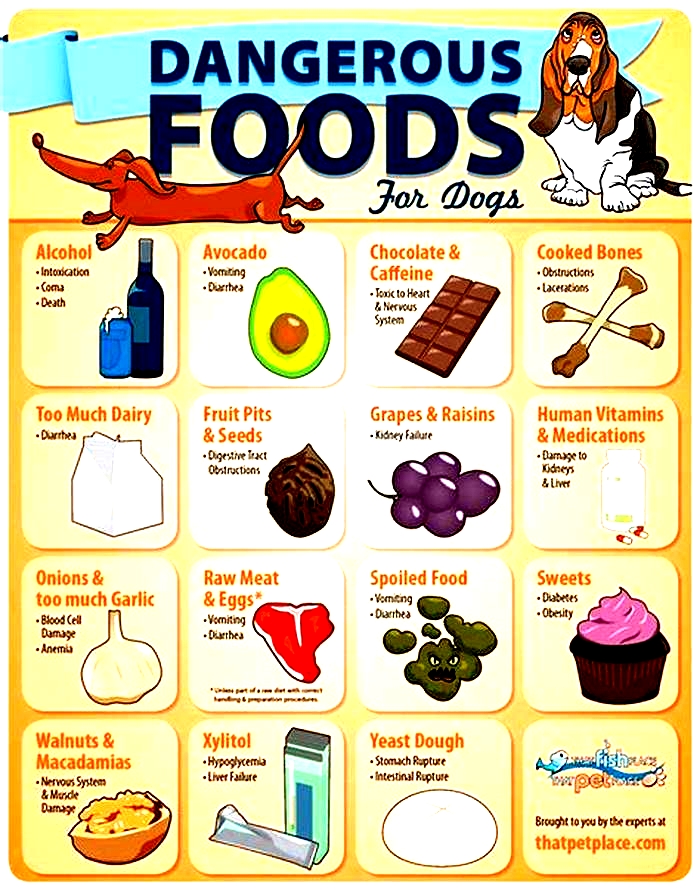Why can t dogs eat avocado
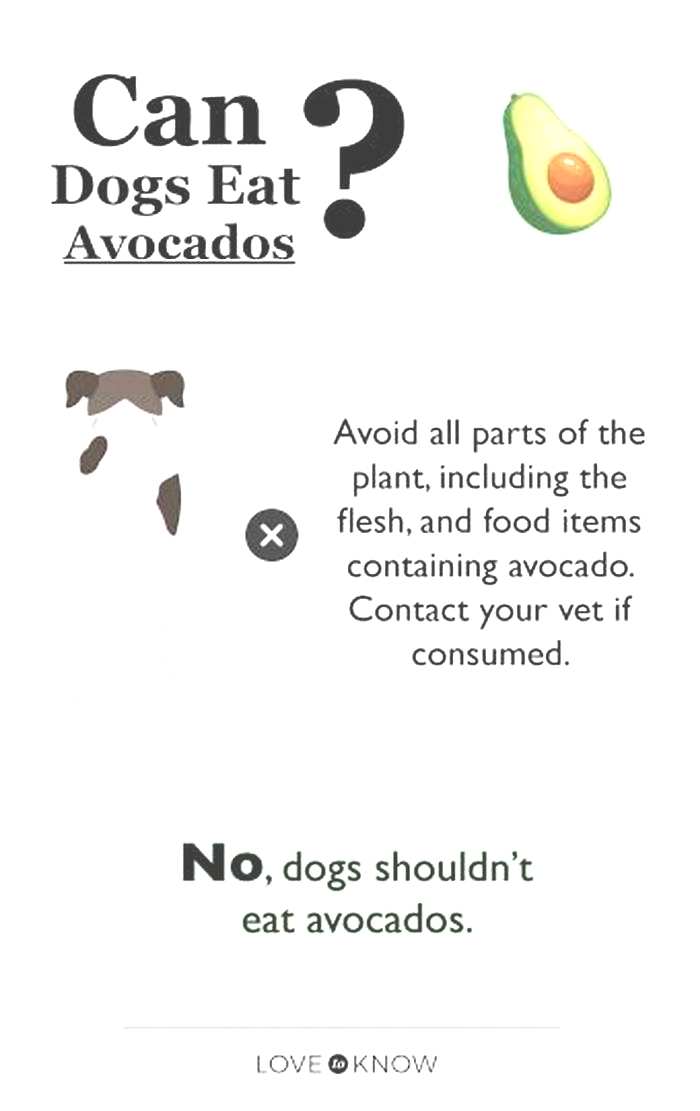
Can Dogs Eat Avocado?
NOTE: Always check with your veterinarian first before giving your dog any new foods, especially people foods. What might be okay for one dog might not be good for your dog, depending on multiple factors, such as their age, health history, health conditions, and diet. Dogs on prescription diets should not be fed any food or treats outside the diet.
You were slicing an avocado for your Cobb salad, and your black Labrador Retriever scarfed up a slice that slid off the cutting board.You panic.
Are avocados poisonous to dogs? Should you take your dog to the emergency clinic? Or are avocados actually good for dogs?
Relax and take a deep breath. It is likely that your pup will be just fine. Heres everything you need to know about dogs and avocados.
Can Dogs Have Avocados?
Heres a breakdown of each part of an avocado and whether dogs can eat it.
Avocado Flesh/Pulp
Avocado pulp is not toxic to dogs, and there are some health benefits to eating the flesh of an avocadoincluding vitamins, fatty acids, and antioxidants. However, avocados are also high in fat, which can cause pancreatitis.
Pancreatitis is inflammation of the digestive organ called the pancreas. In some cases, this condition can even be fatal. Some dogs can develop pancreatitis even if they only eat a small amount of avocado pulp.
You can give your dog the same benefits that they would get from avocados by feeding them other foods that are lower in fat and do not come with the risk of pancreatitis.
Avocado Pit
The pit of an avocado doesnt digest particularly well in a dogs intestinal tract and might cause a gastric or an intestinal blockage.
Once a dog eats an avocadoif their system is not able to process the pitit will become stuck partway through the intestinal tract. If this happens, the only treatment is to surgically remove itjust as if it was a rock, rubber ball, or any other indigestible object.
Avocado Leaves, Bark, and Skin
The one known poison in avocados is persin. Dogs and cats do not appear to be sensitive to this poison, although other animals certainly are.
Persin is a natural antifungal compound that can be produced within the avocado plant. The levels of persin vary between different types of avocados and other external factors. It is present in theleaves, skin, seeds, and fruit of the avocado.
Ingestion of large amounts of persin might bother a dogs stomach, but your dog would have to eat a lot of leaves, bark, or avocado peels. Although dogs might eat the pits, not many dogs will sit down to graze on a meal of avocado leaves.
Can Dogs Eat Guacamole?
No, dogs should not be given guacamole. One of the things that makes it so tasty to humans is all the additional ingredients that are added to it, like onion, garlic, and salt. Garlic and onion are dangerous for dogs, and salt is not healthy for them. It might be okay to share a small amount of avocado with your dog, but guacamole should stay off limits.
Can Dogs Have Avocado Oil?
Avocado oil isnt toxic to dogs because it does not contain persin, and its high in the anti-inflammatory compounds of vitamin E and omega fatty acids. However, its still not considered safe for dogs. This is because its very high in fat, which can trigger pancreatitis in susceptible dogs. It is safest to avoid it altogether.
Can Dogs Be Allergic to Avocado?
Allergies develop with repeated exposures over time. If you are frequently sharing avocado with your dog, it is certainly possible for them to develop a food allergy, but this would be considered rare.
What To Do if Your Dog Eats Avocado
If your dog or puppy eats the pulp of an avocado, watch them for 24-48 hours and report any vomiting, diarrhea, or signs of abdominal discomfort to your veterinarian.
Dogs that develop pancreatitis often start with mild signs of vomiting, which can progress to become life-threatening with time. If your dog has eaten the pit or appears to be choking on part of the avocado, this is an emergency, and you should go to an emergency facility as quickly as possible.
How Vets Treat Dogs That Ate Too Much Avocado
Most dogs that have eaten too much avocado and are showing signs of gastrointestinal distress are treated with fluids and medications to try and relieve their discomfort.
If your dog seems to be having more severe symptoms, your veterinarian will likely recommend a blood panel as well as x-rays. If pancreatitis has developed, your dog will probably need to stay in the hospital for treatment with IV fluids and injectable medications to relieve the inflammation in their pancreas.
Fortunately, eating too much avocado is uncommon in dogs. However, if your pet did eat a lot and starts showing signs of an upset tummy, it is likely time to visit the veterinarian to determine the proper treatment.
Featured Image: iStock/SolStock
Can Dogs Eat Avocado? Everything You Need to Know
Maybe. Peeled and pitted, avocados are fine for dogs to eat and may even provide some health benefits, but they must be served in moderation and prepared with care.
First a note about persin. Avocado trees contain a fungicidal toxin called persin. This toxin is more concentrated in the leaves, pit and skin of an avocado, but there are low levels contained in the flesh as well. Depending on which parts and how much is consumed, avocados can cause an upset stomach, vomiting, diarrhea and myocardial damage.
Additionally, as they are dense in calories and with a high fat content, consuming the flesh of avocado in large quantities has the potential to lead to GI upset and pancreatitis and also to weight gain. Another concern is the stone at the center of the fruit, which may cause choking and intestinal blockages.
Even though the pulp or flesh of avocado is fairly safe for dogs, keep in mind that it can be toxic or harmful for other animals in or around your house. According to the ASPCA, avocado can be toxic to horses, birds, goats and rabbits.
Benefits of Avocado for Dogs
While there are some health benefits to avocadosincluding vitamins, fatty acids and antioxidantsthese benefits can be obtained by feeding other foods that are lower in fat and do not contain the risk of inducing pancreatitis. If you want to give the benefits of avocado to your dog, look for vet-approved prepared foods containing this fruit.
What If My Dog Eats Avocado
Things happen, and despite your best efforts, your dog might get hold of this fruit. Here is what you need to know about how to respond for consumption of each part of an avocado.
Flesh: Since avocado flesh is mildly toxic to dogs, a slice of peeled avocado is unlikely to make your dog sick, says Sandra C. Mitchell, DVM, DABVP, but consumed in larger quantities or avocados eaten whole (stolen from your counter or gathered dropped from an avocado tree), it can be a concern. If you dog does eat avocado in any amount, keep an eye on them for 24-48 hours after eating avocado flesh, and report any vomiting, diarrhea or decreased appetite to your veterinarian.
Skin: Not only does the skin have a larger concentration of the toxin persin and therefore poses a greater risk of vomiting or diarrhea even if eaten in smaller amounts, this outer layer is tough and difficult to digest. If your dog manages to eat the skin of an avocado, watch for symptoms and consult your vet immediately.
Pit: The pit of an avocado doesnt digest particularly well in a dogs intestinal tract and might cause a gastric or an intestinal blockage. Once a dog eats an avocado pitif the dogs system is not able to process itthe pit will become stuck partway through the intestinal tract. Always contact your vet for recommendations soon after the pit is ingested. If you notice your dog is vomiting, straining to poop, in pain or acting lethargic, have them examined by a veterinarian right away.
Can Dogs Eat Avocado? Here's Everything You Need to Know
Here's a breakdown of everything you need to know about safely feeding your dog avocado.
Table of Contents:
Pro tip: The right pet insurance policy can be a lifesaver in case of food poisoning. When faced with costly vet bills, pet parents who have insurance are better equipped to make decisions based on what is best for their dog rather than how it will impact their bank account.
Is avocado safe for dogs?
One of the reasons why avocados are popular is because they are rich in nutrients with known health benefits in humans. These benefits have been extrapolated to dogs. The list of nutrients found in avocados includes:
- Vitamins C, B6, B3, E, and A, which are good for skin and coat health, stronger bones, eyesight, and digestive health, among other things.
- Omega-3 and omega-6 fatty acids, which are responsible for a shiny and healthy coat.
- Niacin, folate, antioxidants, and potassium, which might help fight various diseases, including some types of cancer.
- Avocados also contain good fat, which may help lower cholesterol, but only if given in small amounts.
So, the bottom line is that avocado offers great nutritional value, and when certain parts of the fruit are given in small amounts, it won't harm your dog. In fact, avocados are often found on the ingredient list in certain brands of dog food. However, this doesn't mean that the fruit comes completely risk-free.
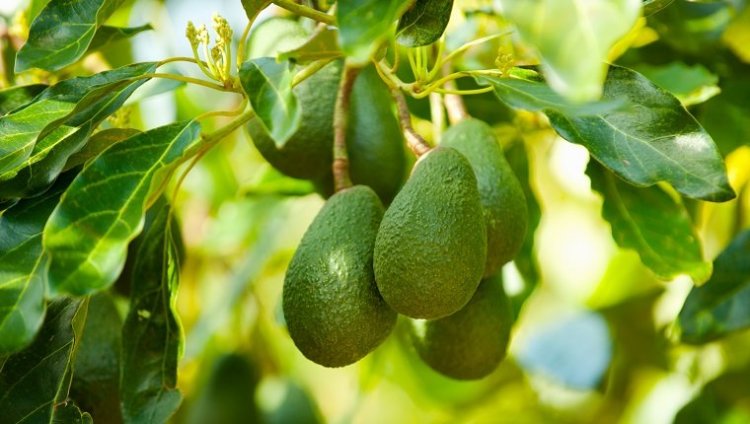
(Image source: DogTime)
When is avocado bad for dogs?
The flesh is the safest part for your dog, but it is not risk-free. Pet parents should avoid giving large amounts of avocado flesh and never feed other parts of the fruit as they can cause toxicity or pose other health risks due to their high-fat content and the size of the pit. Always consult your veterinarian before you give your pet avocados or other human foods.
High-fat content
One of the main nutritional benefits of avocados is that they contain healthy fats. However, too much fat can be dangerous for your furry pal. Dogs who consume large amounts of fat are at risk of developing pancreatitis, which can sometimes result in the need for hospitalization. Also, some dogs have medical conditions that require low-fat diets, while others might develop GI upset, diarrhea, or vomiting if they eat too much avocado.
Risk of allergies
As with other human foods, theres a chance that your furry pal will be allergic to avocados. If you notice signs like sneezing, coughing, hives, diarrhea, gas, or itchy rashes, stop feeding your pet tomatoes and contact your veterinarian. In rare cases, an allergic reaction might lead to anaphylaxis.), a potentially life-threatening condition. Signs such as swelling, hives, and difficulty breathing can be signs of a severe allergic reaction and should prompt you to seek emergency veterinary care.
Avocado toxicity
Persin is a toxin present in the avocado pits, leaves, skin, and the actual plant, so all these parts are potentially toxic to pets. Small amounts of this toxin are also present in the fruits flesh. Exactly what amount of persin is lethal is not yet known but in large amounts, it can cause diarrhea, vomiting, and myocardial (heart muscle) damage.
The good news is, while this toxin can be lethal to birds, goats, cattle, and horses, dogs are more resistant to persin. Your dog would have to ingest a large number of avocados to experience toxic effects. Still, its better to stay on the safe side and keep your dog away from the avocado plant, as the concentrations of the toxin are higher in the stem, pits, bark, and leaves.
Avocado pit
When it comes to avocados, the greatest danger for canines is the avocado pit. The avocado pit (or avocado seed) contains persin, but even more importantly, it presents a choking hazard and potential for GI obstruction. While choking is rare in pets, it is a life-threatening emergency if the pit becomes lodged in the airway or esophagus.
Even if the golf ball-sized pit gets to the stomach without incident, it can lodge in the GI tract and cause an intestinal blockage, which requires emergency surgery to treat.
Pro tip: If your pet ingests an avocado pit, contact your vet right away. It is also a good idea to stay on the safe side with a pet insurance plan, which can cover unexpected costs. In the event something does happen, you can take comfort in knowing your dog is protected.
Can dogs eat avocado oil?
Avocado oil contains omega-3 fatty acids and vitamin E, which help reduce inflammation in the body. Because the pit, skin, stem, and leaves of avocado arent safe for dogs, avocado oil is a risk-free way to reap the benefits of this fruit. Avocado oil does not contain persin and is considered non-toxic to dogs.
However, just like the avocado fruit, avocado oil contains high levels of fat, so you should only feed it to your dog in small quantities and consult your veterinarian before administering it.
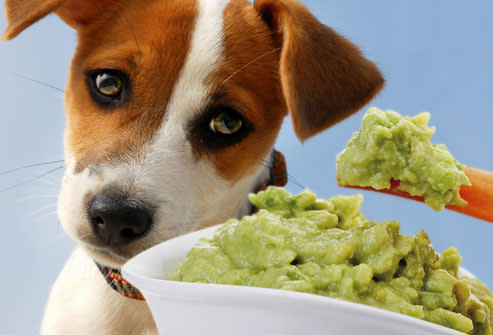
(Image source: Pet WebMD)
Can dogs eat guacamole?
As mentioned earlier, the avocado fruit itself is safe for your canine companion to eat in small quantities, but when it comes to guacamole, you should be more careful. While this avocado dip is delicious, it contains several ingredients that can be harmful to canines, including garlic, onions, and salt.
These foods can cause many problems, ranging from an upset stomach to serious poisoning. Garlic and onions are especially dangerous for dogs and if consumed in larger quantities, they can cause kidney failure and organ damage.
Safer fruit and vegetable alternatives
While avocados have the potential to offer some health benefits, the same benefits can be obtained from other foods that contain lower levels of fat.
If youre looking to supplement your dogs diet with healthy vegetable treats, you can choose from a wide variety of options, including:
Cabbage, brussel sprouts, and broccoli can also be fed to dogs, but only in small quantities as they can irritate their stomachs and cause gas.
When it comes to fruits, pet parents should be more careful. Most fruits contain high levels of natural sugar, which is why they should only be fed occasionally and in moderate amounts. The list of dog-safe fruits includes:
Be sure to remove the skin and seeds from all fruits before offering them to your four-legged family member.

